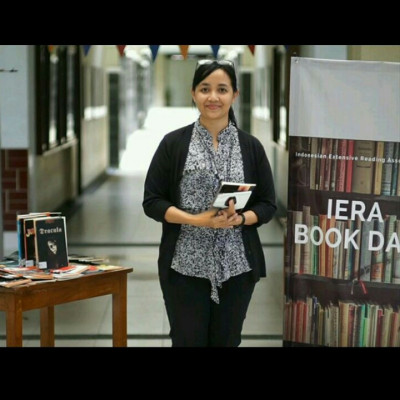Sessions / School
The impact of extensive reading on the TOEIC score among Japanese high school students #3193
This study analyzed the impact of extensive reading (ER) on the TOEIC score among Japanese high school students. ER was administered for three academic years to three grades each with 250 students respectively. The individual reading amount and their TOEIC scores were recorded by the English teacher. The students were encouraged to read 200,000 words per year mainly outside of the classroom. Students read 5,000 words per week, which is 10 minutes per day for students who read 100 wpm, for five days a week, during 35 weeks of school, plus 25,000 words during the long vacations. The study showed that these students scored 650 or higher on the TOEIC test. The study also explains how to implement ER in a regular Japanese high school without eroding the fixed curriculum, and how the involvement of the school library supported ER and student motivation.
The effects of two-year-long extensive reading on TOEIC Bridge IP scores #3217
The purpose of this study was to examine whether a difference exists in TOEIC Bridge Institutional Program scores between Japanese EFL students at a technical college who engaged in ER for one year and those who did ER for two years. Furthermore, by dividing the students who experienced ER for two years into two subgroups according to their level of English achievement at the end of ER, their reading tendencies were statistically analyzed in terms of the number of words and books they had read. The results suggest that two-year-long ER may be more effective in improving TOEIC Bridge reading scores than a year-long ER program, and that students may be able to reach a high level of English proficiency without reading too many books as long as they are suited to the students’ levels. Additionally, students with high English proficiency made greater progress through ER.
Extensive reading and critical reading skills and in the EFL classroom #3184
This action research study, conducted with 13 eleventh grade students from a public school in Piedecuesta, Colombia, was focused on establishing how the implementation of an Extensive Reading technique in the EFL learning school context contributed to the development of critical reading skills in L2. Diagnostic tests, video recordings, teacher’s journal and students’ diaries, and posttests were used as instruments to gather information to determine any improvement. The results revealed the positive impact ER had in the classroom to foster students’ reading process. In such a way, the participants demonstrated the use of different reading strategies to deal with texts, and the teacher-researcher reflection upon her pedagogical praxis during pandemic collected valuable information of the remote educational processes and its difficulties.
The Impact of Extensive Reading by Applying Two Reading Sites to Improve Learners’ Lexical Knowledge for Reading Comprehension #3287
Drawing on the benefits of Krashen’s comprehension hypothesis (2003) and compelling input hypothesis (2018), Ellis’ “implicit learning without conscious awareness” (2008) and Grabe’s “long-term and large volumes of input” (2009), extensive reading (ER) has been found beneficial to develop the learners' comprehension. This study investigated the impact of extensive reading of two reading sites, BBC English learning and British Council Learning English on high school EFL learners. This study examined if ER facilitated target learners’ lexical and cultural knowledge to develop reading comprehension. Learners of the treatment group (n = 35) and control group (n = 35) received instruction with ER and without ER, respectively, for six months by adopting two International English Language Testing System (IELTS) tests. The mixed-method paradigm triangulated the data to gauge changes in them. The result showed that treatment group learners outperformed the control group, which is statistically significant and implied incorporating the extensive reading as an extra-curricular.
English for Life: 21st Century Skills through reading #3226
Students will tell you that they don’t like reading, but this is simply not true. On social media and through instant messaging students are reading (and writing) all the time – more than any other generation before them. They do not think of this as reading. Moreover, they are following engaging narratives about people, and responding to what they read on various important cognitive, emotional and social levels. Our classroom practices must and can be adapted now to connect with this very positive reality. So, if we introduce reading which is easy, in contexts learners understand and enjoy, they will be more motivated and will develop essential 21st century life skills alongside natural, meaningful language development. This session looks at ways to implement this with young adults, encouraging them to see how reading leads defining and redefining our values by exploring the lives and cultures of others.
Diffusion of ER to the public schools in Asia: An iconoclastic view of extensive reading #3248
This discussion is centered about the process of extensive reading (ER) program implementation in schools from a functional perspective. There are many factors that may have hindered the spread of ER into the public school systems of many countries such as the need for and expense of graded readers, the means to handle the lending and return of books, the general mindset geared to intensive study in order to pass examinations, and the already heavy demands placed on public school teachers. It makes an argument for a top-down approach being required for wide-spread implementation as well as the need for materials other than graded readers, which while being the gold standard for ER, cannot realistically be purchased by and managed in a large school system. The impact on student choice of what to read is also discussed. We will then proceed to a discussion with the participants concerning a way forward.
Building a Nation of Readers from Scratch #3244
In February 2022, the Thailand Extensive Reading Association (TERA) in collaboration with Sakdibhornssup Foundation launched a project called “Building a Nation of Readers”. The project provides an opportunity for secondary school students across Thailand to have hands-on experience of extensive reading outside of class through a reading marathon event. 200 students participated in the project and were divided into 20 teams with one teacher supervising each team. Xreading.com was used as the platform for the participants to read graded readers of their own choice and to assist the organizing team to keep records of their reading. A webinar on tips for improving reading skills and vocabulary through reading graded readers and a workshop on online extensive reading via Xreading were conducted to prepare the participants for the marathon. This presentation will reveal participants’ opinions and experience of online extensive reading and highlight what needs to be done to keep their love of reading growing.
Read me my text: Peer reading as cultural exchange through extensive reading #3175
Peer reading has been widely practiced for fluency improvement and has implications for the language learners of all ages. It often involves reading loudly in a low-pressure context. In India, schools are present with a wide amount of cultural diversity. Culture exchange through extensive reading is found to be rarely practiced in Indian schools and requires a serious and immediate attention from the teacher community. This study sets out with the belief that there are linguistic and motivational benefits for Indian learners through peer reading activities. The method of this study is designed to have an experimental and control group. The study follows the theoretical framework of the socio-cultural approach to learning and cognitive development and compares the level and quality of interaction and motivation among the learners of two groups.
Encouraging Students’ Extensive Reading using Interactive Virtual Library: A Story from MTsN 1 Pandeglang, Indonesia #3198
Studies indicate that extensive reading has given considerable benefits for language learners (Nation, 1997; Yamashita, 2013; Suk, 2017; Wang & Ho, 2019). However, the major challenge to do extensive reading in an EFL setting is book availability (Renandya et al., 2020). In addition to that, students in the digital age nowadays are strongly dependent on activity-related technology, causing reading to lose its attraction. In the effort of proposing an alternative solution to this challenge, extensive reading needs to be simultaneously implemented with technology. One encouraging way is using Interactive Virtual Library (IVL), which is a contextually-designed free reading resource created by a teacher to support students’ ER practice interactively. In this presentation, we would like to share an Indonesian teacher’s best practice in encouraging students’ ER using IVL. Specifically, we would like to describe how the IVL is created, how it looks like, and how it is implemented in the classrooms. In addition, we will also discuss some opportunities that the IVL offers, including how it can be adopted and/ or adapted in other EFL contexts, and how it solves the issue of limited book availability at schools. Furthermore, we will describe some potential challenges from creating and implementing the IVL, and what we can reflect in order to better implement it in the future.
Graded Reader Writing Competition: Motivating Students to Write AND Read #3238
Permission to Record
Extensive reading and creative writing are two activities that can be both enjoyable and motivating for students. With the objective of combining the two activities, plus to add a competitive element, a graded reader writing competition was held among students at a junior/senior high school in Tokyo, Japan. In this semester-long project, students, under the guidance of their teacher, wrote and illustrated their own graded readers. Despite multiple challenges, the result was successful. Twelve student writers completed novels which were then made available on the Xreading website so they could be read and rated by hundreds of students around the world as well as a panel of volunteer judges. The presenter will discuss the process that was used, share some samples, and explain how the project will be expanded in the future.
Combining Extensive Reading and Environmental Protection #3232
This presentation describes a project that involved senior high school students in Malaysia in an English class where they did extensive reading in preparation for educating younger students about actions everyone could take to reduce climate change. In groups of 4-5, guided by cooperative learning principles, students chose their own environmental topics, researched them (mostly online), and prepared posters and other materials. The technique Gallery Tour was used in which the groups of older students stationed themselves and their materials around the classroom, and the younger students visiting from another class circulated among the various host groups who explained their ideas and fielded questions and comments. Extensive reading was involved in the initial preparation of the materials, in their refinement, and in responding to the questions and other feedback from the visiting class.
The Exquisiteness of Extensive Reading to Minh Duc Secondary School Students #3278
In the busyness of life. Extensive Reading sounds boring for some Students. A lot of Secondary students Minh Duc Secondary School in District1, in Hochiminh City Vietnam are not happy when they are asked about reading and especially when they are mandated to read. There are three purposes of this paper. The first is to elucidate the theory and principle of Vietnamese Teachers underlying their extensive reading beliefs. The deep-rooted principles will be discussed in light of practical classroom and contextual consideration in the parts of the students of Minh Duc Secondary School. Secondly, a critical summary of current research on extensive reading that has been conducted in English as a Second Language and English as a Foreign Language contexts and has been tested for this school year 2021-2022. By giving importance to the immeasurable benefits of extensive reading in improving many aspects of L2 learners’ language proficiency, I hope to encourage great implementation of extensive reading in educational institutions in District 1,Hochiminh City. Vietnamese Teachers will also be acquainted with future directions in the practice of implementing extensive reading programs such as how to make use of the online resources, and available books at the library and be potentially equipped on making use of the internet to assess students 'potential And progress in reading extensively. Thirdly, the paper provides directions for steps that can be used for future Public Schools teachers on how-to conduct an extensive reading with Vietnamese students which I believe might fill in the gap in knowledge for Extensive Reading. The conducted research was conducted using goggle forms and goggle classroom to evaluate the difficulties met in expensive Reading .thus, it gives light to the joyfulness of extensive reading on the parts of the students and leads to the analysis of the importance of Extensive Reading.
Extensive Reading Habits of Learners in Lower Secondary Schools: Reflections from Ethiopia #3167
Reading literacy is significant for learners’ academic success, and high levels of reading literacy can be established through strong engagement in extensive reading. It is seems that the advancement of competing media, such as television and computer games and the fluctuating socio-cultural contexts have made a significant influence on learners’ extensive reading habits. The purpose of this study was therefore to investigate lower secondary school English as a foreign language (EFL) learners’ extensive reading habits using descriptive survey design. The data were collected from 377 randomly selected EFL learners in North Wollo Zone, Ethiopia, using a survey questionnaire. Descriptive and inferential (independent samples t-test) statistics were used to analyze the data. The findings of the study indicated that majority of the learners’ habits toward extensive reading was poor. The findings of the study also showed that the EFL learners’ mostly read for academic purposes. It was also found that there was no significant difference (p > .05) between gender and age of learners regarding their extensive reading habits. Lack of reading materials, low English ability, and lack interest in reading are the major factors that affect EFL learners’ extensive reading habits. Based on the results, it can be suggested that integrating extensive reading programme in the EFL curricula, being accessible to a wide range of books (based on the learners’ level and interest) in the school libraries, and establishing school reading clubs in input-poor English as a Foreign Language contexts like Ethiopia is essential to promote learners’ extensive reading habits.

















